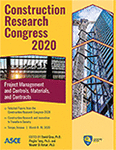Construction Research Congress 2020
The Role of Architects in Design-Manufacturing-Build of Building Industry: A Case Study
Publication: Construction Research Congress 2020: Project Management and Controls, Materials, and Contracts
ABSTRACT
The benefits of modular construction, that include addressing the shortage of labor, reducing bulks of construction waste, minimizing construction schedule delays, and providing a safer environment for workers offsite, drive the building industry toward prefabrication and industrialization. However, industrialization requires the transformation of deliveries and services to engage a “design-manufacturing-build” process in building construction. More is involved than simply making boxes in a factory and installing the modules at the jobsite. This paper focuses on the role of architects in this process particularly in obtaining the building permit and in the inspection processes. In other words, how can the architect as the master builder or “jack of all trades” facilitate the integration of needs among the multiple stakeholders? Modular construction requires a change in pre-construction phase and building inspections; not just within the design and engineering trades but also for municipality decision makers and lenders. Architects play a key role in improving the offsite construction through design leadership and coordination. They must deal with the way the building is divided into modules and how multiple authorities having jurisdiction, navigate multi-state and sometimes multinational permit delivery processes and reviews addressing the project. The research methodology is a case study of an architectural firm that has practiced modular design and construction for a decade in the northwest region of the United States. After an overview of the role of the architects in “design-manufacturing-build”, this paper illustrates how the architectural firm overcame the challenges with suggestions to improve the review process for building permits and inspections.
Get full access to this article
View all available purchase options and get full access to this chapter.
REFERENCES
AIA (2019). Design for Modular Construction: An Introduction for Architects, <http://content.aia.org/sites/default/files/201903/Materials_Practice_Guide_Modular_Construction.pdf>
Bernstein, H. M., Gudgel, J. E. & Laquidara-Carr, D. (2011). Prefabrication and Modularization: Increasing Productivity in the Construction Industry. SmarkMarket Report, edited by McGraw-Hill Construction: National Institute of Standards and Technology.
Cameron, P. J., & Di Carlo, N. G. (2007). Piecing together modular: understanding the benefits and limitations of modular construction methods for multifamily development (Doctoral dissertation, Massachusetts Institute of Technology).
Edmonds, C., Golden, N., & McKenna, C. (2018). Modular Construction for Multifamily Affordable Housing. United States of America: WSP. <https://cdn.ymaws.com/www.nibs.org/resource/resmgr/oscc/epa-modular-construction-for.pdf>
Ellis, C. (1991). Sociological introspection and emotional experience. Symbolic interaction, 14(1), 23-50.
Lawson, M., Ogden, R., & Goodier, C. (2014). Design in modular construction. CRC Press.
Kibert, C. J., Chini, A. R., Rumpf-Monadizadeh, S., Razkenari, M. (2016). Basics of manufactured construction. University of Florida, United States.
Piper, C., (2015), Modular Building Institute, Introduction to Commercial Modular Construction. Modular Building Institute
McIlveen, P. (2008). Autoethnography as a method for reflexive research and practice in vocational psychology. Australian journal of career development, 17(2), 13-20.
Rahman, M. M. (2013). Barriers of implementing modern methods of construction. Journal of Management in Engineering, 30(1), 69-77.
Smith, R. E. (2010). Prefab architecture: A guide to modular design and construction. John Wiley & Sons.
Vanguard Modular, (2019) Modular Building. Retrieved from <https://vanguardmodular.com/about-modular/>
Velamati, S. (2012). Feasibility, benefits and challenges of modular construction in high rise development in the United States: a developer's perspective (Doctoral dissertation, Massachusetts Institute of Technology).
Information & Authors
Information
Published In
Construction Research Congress 2020: Project Management and Controls, Materials, and Contracts
Pages: 1358 - 1365
Editors: David Grau, Ph.D., Arizona State University, Pingbo Tang, Ph.D., Arizona State University, and Mounir El Asmar, Ph.D., Arizona State University
ISBN (Online): 978-0-7844-8288-9
Copyright
© 2020 American Society of Civil Engineers.
History
Published online: Nov 9, 2020
Published in print: Nov 9, 2020
Authors
Metrics & Citations
Metrics
Citations
Download citation
If you have the appropriate software installed, you can download article citation data to the citation manager of your choice. Simply select your manager software from the list below and click Download.
